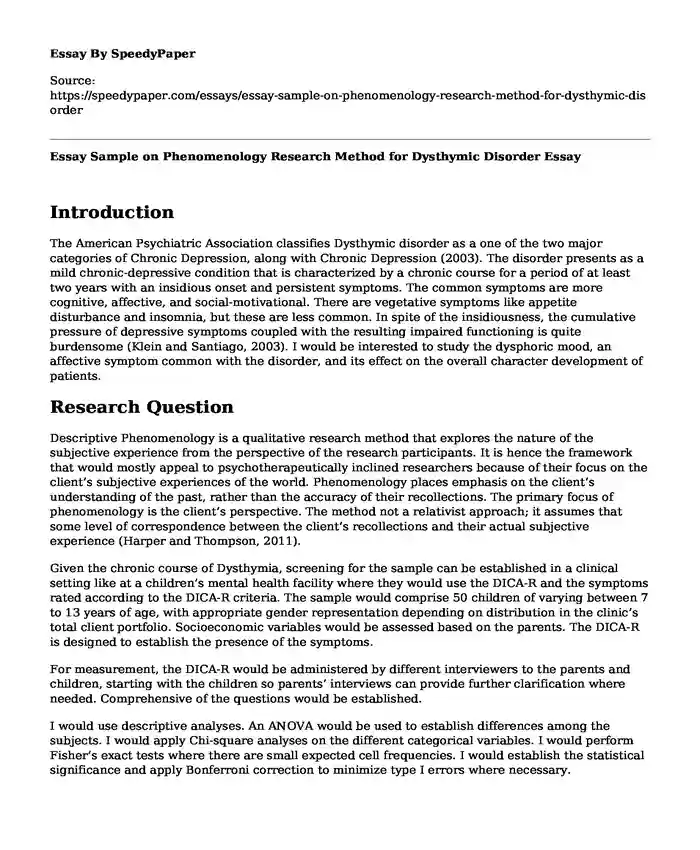
| Type of paper: | Essay |
| Categories: | Depression Psychological disorder |
| Pages: | 3 |
| Wordcount: | 556 words |
Introduction
The American Psychiatric Association classifies Dysthymic disorder as a one of the two major categories of Chronic Depression, along with Chronic Depression (2003). The disorder presents as a mild chronic-depressive condition that is characterized by a chronic course for a period of at least two years with an insidious onset and persistent symptoms. The common symptoms are more cognitive, affective, and social-motivational. There are vegetative symptoms like appetite disturbance and insomnia, but these are less common. In spite of the insidiousness, the cumulative pressure of depressive symptoms coupled with the resulting impaired functioning is quite burdensome (Klein and Santiago, 2003). I would be interested to study the dysphoric mood, an affective symptom common with the disorder, and its effect on the overall character development of patients.
Research Question
Descriptive Phenomenology is a qualitative research method that explores the nature of the subjective experience from the perspective of the research participants. It is hence the framework that would mostly appeal to psychotherapeutically inclined researchers because of their focus on the client’s subjective experiences of the world. Phenomenology places emphasis on the client’s understanding of the past, rather than the accuracy of their recollections. The primary focus of phenomenology is the client’s perspective. The method not a relativist approach; it assumes that some level of correspondence between the client’s recollections and their actual subjective experience (Harper and Thompson, 2011).
Given the chronic course of Dysthymia, screening for the sample can be established in a clinical setting like at a children’s mental health facility where they would use the DICA-R and the symptoms rated according to the DICA-R criteria. The sample would comprise 50 children of varying between 7 to 13 years of age, with appropriate gender representation depending on distribution in the clinic’s total client portfolio. Socioeconomic variables would be assessed based on the parents. The DICA-R is designed to establish the presence of the symptoms.
For measurement, the DICA-R would be administered by different interviewers to the parents and children, starting with the children so parents’ interviews can provide further clarification where needed. Comprehensive of the questions would be established.
I would use descriptive analyses. An ANOVA would be used to establish differences among the subjects. I would apply Chi-square analyses on the different categorical variables. I would perform Fisher’s exact tests where there are small expected cell frequencies. I would establish the statistical significance and apply Bonferroni correction to minimize type I errors where necessary.
Conclusion
In conclusion, I would expect in conducting the research would be the negotiation of consent with my child subjects. This issue is also intrinsic to the subject of the study since the quality of the response would depend on the rapport that the interviewers have with the children. In dealing with this issue, I would prefer to use the children’s regular therapists as my interviewers. This would also avoid disruption of ongoing treatment.
References
American Psychiatric Association. (2013). Diagnostic and Statistical Manual of Mental Disorders. (DSM-5®). American Psychiatric Pub.
Klein, D. and Santiago, N., 2003. Dysthymia and chronic depression: Introduction, classification, risk factors, and course. Journal of Clinical Psychology, 59(8), pp.807-816.
Harper, D., & Thompson, A. R. (Eds.). (2011). Qualitative research methods in mental health and psychotherapy: A guide for students and practitioners. John Wiley & Sons.
Cite this page
Essay Sample on Phenomenology Research Method for Dysthymic Disorder. (2023, Oct 17). Retrieved from https://speedypaper.net/essays/essay-sample-on-phenomenology-research-method-for-dysthymic-disorder
Request Removal
If you are the original author of this essay and no longer wish to have it published on the SpeedyPaper website, please click below to request its removal:
- Whole Woman's Health Case
- Articles Analysis Essay Sample on Obesity
- Annotated Bibliography for Autism Spectrum Disorder - Free Paper
- Free Essay: Impacts of Vaping
- Essay Example on Benefits of Social Media Platform in Healthcare
- Essay Sample on Definition and Summary of the Disability.
- Essay Sample on Why Mathematics Appeals to My Composed and Explicit Personality
Popular categories




